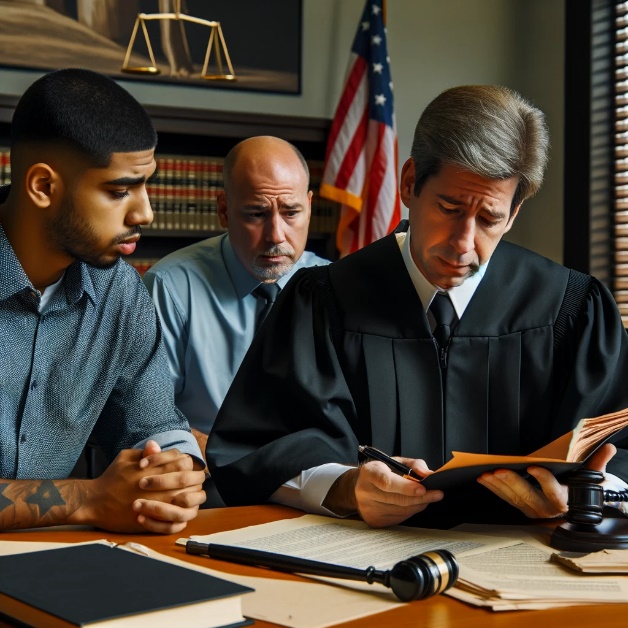 Community supervision in Texas serves as an alternative to incarceration, where judges can place defendants under specific conditions instead of sending them to jail. These conditions, often tailored to the individual's case, aim to reform the defendant, protect the community, and ensure justice for victims. The effectiveness of these measures largely depends on how well they address the specific needs and risks of the defendant.
Community supervision in Texas serves as an alternative to incarceration, where judges can place defendants under specific conditions instead of sending them to jail. These conditions, often tailored to the individual's case, aim to reform the defendant, protect the community, and ensure justice for victims. The effectiveness of these measures largely depends on how well they address the specific needs and risks of the defendant.
Understanding Discretionary Conditions
Discretionary conditions are specific requirements that a judge can impose on someone under community supervision in Texas. These conditions vary widely, from mandating employment and setting curfews to requiring drug testing and participation in rehabilitation programs. Judges decide on these conditions by first looking at evaluations of the defendant's risk to the community and personal needs—this could include their background, previous behavior, and current circumstances. The goal is to tailor the supervision to help the defendant reintegrate into society while minimizing the risk of committing another offense.
Basic Conditions of Community Supervision
When you are on community supervision in Texas, you must follow certain basic conditions set by the judge. One key condition is that you should not commit any new crimes. This includes avoiding all illegal activities, whether they are related to drugs, theft, or violence. You also need to stay away from habits that can harm you or others, like using illegal drugs or excessive drinking.
Another important part of your community supervision is to maintain steady work and live at an approved residence. The judge might set specific rules about where you can live and work, depending on your situation. Additionally, you are required to check in regularly with your supervision officer. This means you must report to them as directed, and you have to let them visit you at home or wherever else they need to.
These conditions help ensure that you are living a stable and lawful life while under supervision. They are designed not just to monitor you, but to help you reintegrate into your community safely and responsibly.
Financial Obligations
Part of your community supervision may also involve financial responsibilities. If the court has ordered you to pay fines or court costs, you need to make these payments as directed. These costs often include the charges for processing your case in the judicial system.
Supporting your dependents is another financial obligation you might face. This means you need to continue providing for your family's basic needs like food, shelter, and clothing. If you are financially capable, you might also be required to cover the costs of legal services you received.
You may also need to pay for expenses related to the victim of your offense. This could involve reimbursing the victim for counseling or other medical expenses they needed because of the incident. These financial conditions are meant to help cover the costs associated with your case and to support those affected by your actions. In Texas, you need to meet these financial obligations to fulfill the terms of your community supervision.
Rehabilitation and Treatment
When you are placed on community supervision in Texas, you might need to participate in various programs and meet specific requirements aimed at your rehabilitation. These can include substance abuse programs, which might require you to get tested for drugs and alcohol regularly. This testing helps ensure that you're following the terms of your supervision and supports your recovery.
Another requirement could be attending counseling sessions. These sessions are designed to address behaviors or issues related to your offense. Counseling could be general or focused on substance abuse, depending on your needs. The goal is to help you make positive changes in your behavior and assist in your rehabilitation process.
 You might also be asked to participate in victim-defendant mediation. This is a process where you, as the defendant, meet with the victim of the crime in a controlled environment to discuss the impact of the crime and possibly reach a mutual understanding or agreement. This can be an important step in repairing harm and moving forward.
You might also be asked to participate in victim-defendant mediation. This is a process where you, as the defendant, meet with the victim of the crime in a controlled environment to discuss the impact of the crime and possibly reach a mutual understanding or agreement. This can be an important step in repairing harm and moving forward.
Community Involvement and Restitution
Part of your community supervision could involve engaging in community service. You may be required to work a set number of hours in service projects approved by the court. These projects help you give back to the community and can be a meaningful way to contribute positively. The type of work you do can vary, but it will generally be something that benefits the public or helps improve the local area.
In some cases, instead of performing community service, you might be allowed to make donations to local charities or nonprofits. This option can be particularly relevant if you are unable to perform physical work because of health reasons or other constraints. Additionally, if the court finds it appropriate, you may need to provide public notice of your offense. This could involve publicly acknowledging the crime you committed.
Special Conditions Based on Offense Type and Defendant’s Circumstances
If you are placed on community supervision, the conditions you face can vary depending on the type of offense you committed and your specific needs. Judges may require you to submit to periods of confinement as part of your supervision. This confinement might be in a county jail for a short time or as part of a treatment program, especially if you are dealing with substance abuse issues. For more serious drug-related offenses, you might be placed in a substance abuse felony punishment facility operated by the Texas Department of Criminal Justice. Here, you would undergo treatment and, upon release, participate in ongoing care plans to help prevent relapse.
For offenses involving drugs, additional supervision conditions can be tailored to address substance dependency. This might include mandatory drug testing, attending counseling sessions, or participating in educational programs about the risks and legal consequences of drug use.
Implications for Defendants
The conditions imposed during community supervision have a deep impact on both the defendant’s life and the community. For defendants, these conditions can significantly alter daily routines and behavior, steering them towards rehabilitation. It’s also important to note that there are penalties for violating community supervision.
Contact Our Austin Community Supervision Lawyers
Discretionary conditions of community supervision in Texas strike a balance between protecting public safety and supporting the rehabilitation of defendants. These conditions not only aim to prevent further offenses but also offer a structured path for defendants to put the past behind them and successfully reintegrate into society. If you or someone you know is facing criminal charges, it’s important to understand the full range of legal options available and your next steps. You can reach out to the experienced Austin, Texas criminal defense lawyers at Cofer & Connelly, PLLC for guidance by calling (512) 991-0576 or contacting us online for a consultation.

